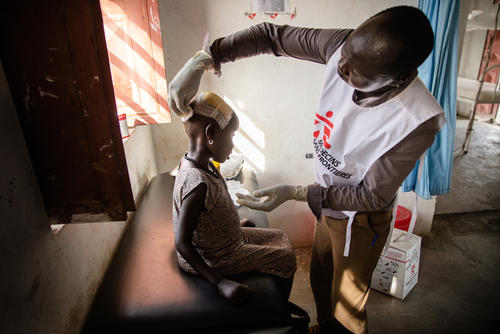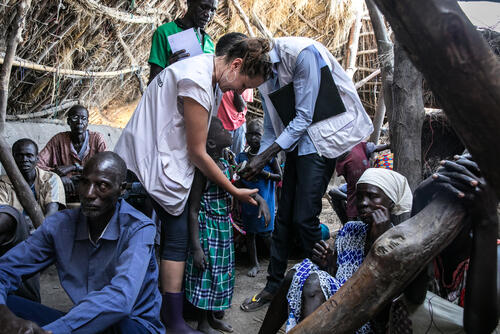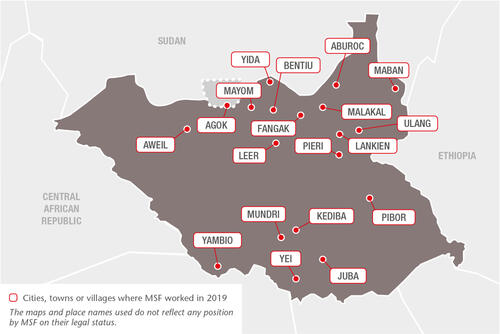
1,120,900
1,120,9
292,100
292,1
61,000
61,

60,500
60,5
14,100
14,1
6,720
6,72

5,400
5,4
4,480
4,48
4,010
4,01

370
37
Médecins Sans Frontières (MSF) worked in 19 project sites across South Sudan in 2019. Activities ranged from treating gunshot wounds in Agok and providing comprehensive medical care in Protection of Civilians (PoC) sites, to vaccinating children against deadly diseases such as measles and ensuring Ebola preparedness at the border with the Democratic Republic of Congo.
Most medical services in South Sudan are delivered by NGOs, as only 2.6 per cent of the government’s budget is allocated to health. For many communities, treatment is often difficult to reach or simply inexistent.
Responding to massive flooding
Nearly one million people were affected by unprecedented heavy flooding, which began in July. On 30 October, the South Sudanese government declared a national state of emergency.
Thousands of people were displaced, including many of our local colleagues, who lost their homes, crops and livestock. To respond to the health needs, we deployed emergency teams in and around Pibor, Maban, Lankien and Ulang. In Pibor, one of the worst affected areas, our health centre was submerged and destroyed. A temporary tented facility was set up to provide care for people in Pibor, Maban and Gumuruk, including outpatient, inpatient and maternity services.
Mobile clinics were set up in all areas where we were working to prevent and treat malaria, respiratory tract infections, diarrhoea, skin infections and malnutrition. We also repaired latrines and boreholes, set up water purification systems to supply safe drinking water to the displaced and host communities and, distributed thousands of relief items to those most affected by the flooding, which included water purification solution and mosquito nets people could use themselves to prevent diseases such as diarrhoea and malaria.
Working with the community to tackle malaria
In 2019, malaria remained a major health concern in South Sudan. We treated more than 292,100 adults and children and ran prevention and awareness-raising activities in nearly all our projects. Strategies included distributing mosquito nets and implementing new outreach methods. For example, in March, we introduced integrated community case management in Old Fangak, delivering malaria rapid tests and treatment through trained community health workers in remote settings that have limited access to health care. Teams treated 530 patients for malaria and 3,450 patients for simple diarrhoea in 2019.
Our staff in Yambio also worked on treating and preventing malaria at a community level, conducting 38,000 general consultations and treating 24,900 patients, as well as administering seasonal malaria chemoprevention (oral treatment to prevent the disease) to more than 48,100 of the most vulnerable children aged between three and 59 months.
Responding to measles outbreaks
MSF vaccinated or supported the vaccination of over 96,400 children against measles in Yambio, Malakal, Bentiu PoC site, Aweil, Pibor and Maban. We also provided case management wherever possible.
Health services in Leer reopened
In April, we reopened our maternal, emergency and reproductive services in Leer, closed in 2016 due to repeated attacks on our patients and staff. In the first month alone, we treated 300 people, including more than 100 pregnant women.

Refugees and internally displaced people
There are an estimated 1.5 million internally displaced people in South Sudan, as well as nearly 300,000 refugees from neighbouring Sudan. In 2019, we offered medical assistance and distributed relief items to refugees and displaced people in Bentiu, Mundri, Lankien, Malakal, Yida, Yei, Leer, Old Fangak and Doro camp in Maban.
The United Nations PoC sites in Bentiu and Malakal, where we manage a hospital in each, offer protection to vulnerable people who would otherwise be exposed to armed violence. In these sites, the humanitarian and medical needs are great due to poor living conditions, ongoing violence and mental trauma. MSF has repeatedly called for conditions and services within the sites to be improved beyond current levels, in particular water and sanitation.
At our 55-bed hospital in Malakal PoC, where we offer a range of general and specialist services, mental health is also an important focus. Many of the patients have experienced extreme levels of violence and feel a sense of despair because of their environment and situation. We conducted 3,090 individual and group mental health consultations in 2019, most of them in the hospital’s outpatient department.
In Bentiu, the largest PoC in South Sudan with over 100,000 people, we provide specialist healthcare, surgery and emergency services for adults and children in our 160-bed hospital. The Bentiu and Malakal projects also include community outreach activities, such as treatment for infectious diseases at local health centres, raising awareness on prevention and identifying people who may need medical treatment.
In Yei, we support the hospital’s paediatric ward and manages a general healthcare clinic, which offers vaccinations, mental health support and referrals. Outside the town, our staff work in health centres in areas affected by the ongoing violence, which has displaced many people. In some areas of Yei River state, the security forces occupied clinics and there were reports of harassment and abuse of healthcare workers.
In Maban, we provide services in our hospital in Doro camp, which hosts around 60,000 refugees. Our staff also work in the outpatient department in Bunj hospital, which serves some 30,000 people. In 2019, an outreach team undertook regular assessments and spot interventions to address unmet needs around Maban county, such as a lack of basic healthcare and safe water for displaced people. Additionally, in its first phase of activities in South Sudan, the MSF Academy for Healthcare increased the number of trained healthcare professionals in Pibor by bolstering the skills of 42 students. We continued to assist Sudanese refugees in the area.
Mother and child healthcare
In Aweil, we manage a regional hospital that includes a maternity component. This hospital also serves as a training ground for nurses and midwives of a local school, while three physicians are receiving essential surgical skills training there.
Our 80-bed hospital in Lankien also provides obstetric and paediatric care, nutritional support and treatment for HIV, TB and kala azar. Treatment for victims of sexual and gender-based violence, which is integrated into all our projects in South Sudan, is available too.
Abyei Special Administrative Area
In Abyei, a disputed area between Sudan and South Sudan, we completed the reconstruction of our hospital in Agok in February. It is the only secondary health care facility in the region and has eight wards, an operating theatre and a pharmacy.

















